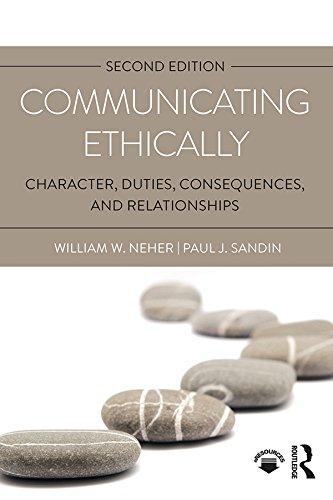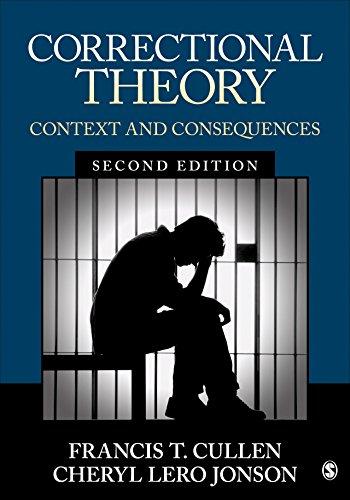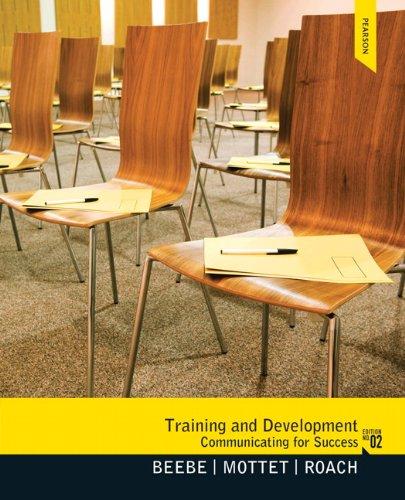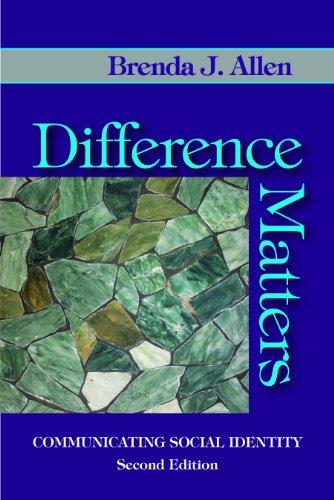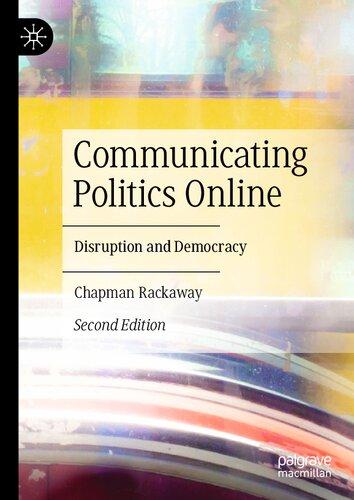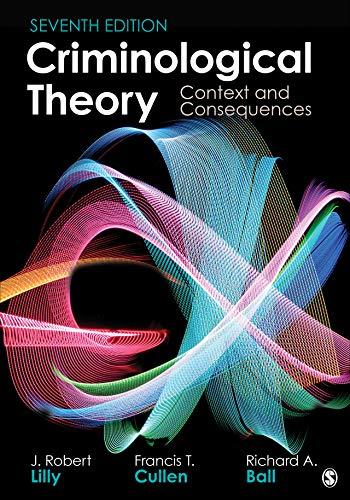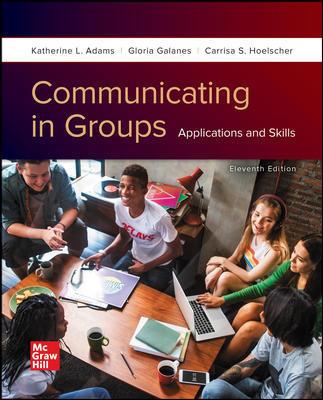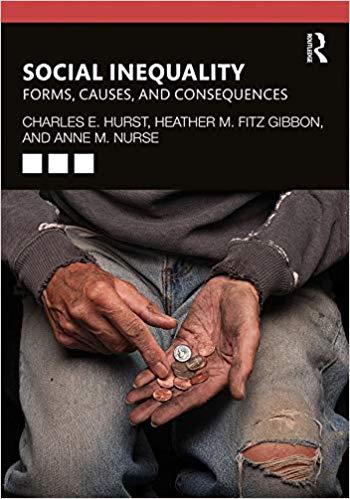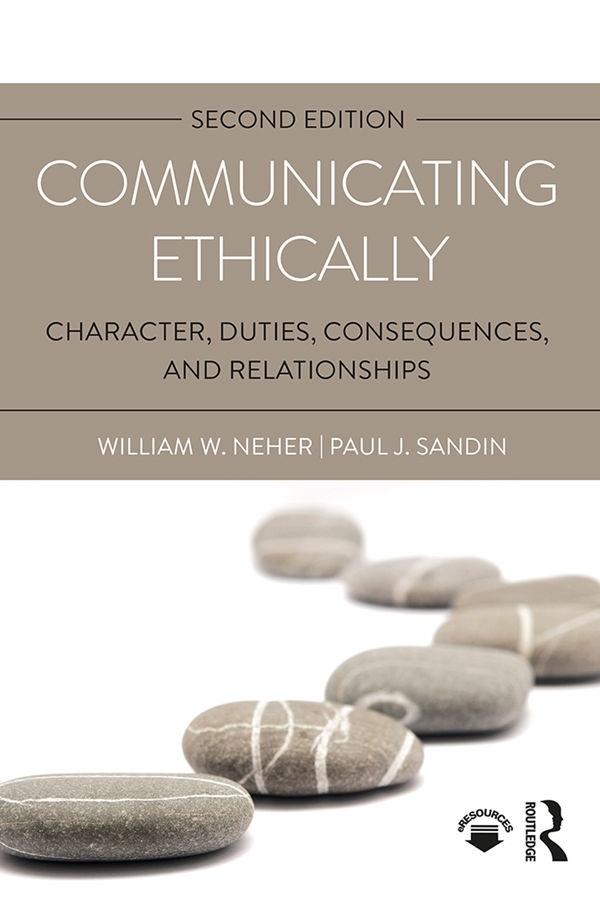Communicating Ethically: Character, Duties, Consequences, and Relationships 2nd
Edition, (Ebook PDF) Visit to download the full and correct content document: https://ebookmass.com/product/communicating-ethically-character-duties-consequen ces-and-relationships-2nd-edition-ebook-pdf/
More products digital (pdf, epub, mobi) instant download maybe you interests ...
Correctional Theory: Context and Consequences (NULL) 2nd Edition, (Ebook PDF)
https://ebookmass.com/product/correctional-theory-context-andconsequences-null-2nd-edition-ebook-pdf/
Training & Development: Communicating for Success 2nd Edition, (Ebook PDF)
https://ebookmass.com/product/training-development-communicatingfor-success-2nd-edition-ebook-pdf/
Difference Matters: Communicating Social Identity 2nd Edition, (Ebook PDF)
https://ebookmass.com/product/difference-matters-communicatingsocial-identity-2nd-edition-ebook-pdf/
Communicating Politics Online 2nd Edition Chapman Rackaway
https://ebookmass.com/product/communicating-politics-online-2ndedition-chapman-rackaway/
Intimate Relationships 8th Edition, (Ebook PDF)
https://ebookmass.com/product/intimate-relationships-8th-editionebook-pdf/
Criminological Theory: Context and Consequences 7th Edition, (Ebook PDF)
https://ebookmass.com/product/criminological-theory-context-andconsequences-7th-edition-ebook-pdf/
(eBook PDF) Communicating in Groups: Applications and Skills 11th Edition
https://ebookmass.com/product/ebook-pdf-communicating-in-groupsapplications-and-skills-11th-edition/
Intimate Relationships 8th Edition – Ebook PDF Version
https://ebookmass.com/product/intimate-relationships-8th-editionebook-pdf-version/
(eBook PDF) Social Inequality: Forms, Causes, and Consequences 10th Edition
https://ebookmass.com/product/ebook-pdf-social-inequality-formscauses-and-consequences-10th-edition/
CommunicatingEthically CommunicatingEthicallyprovidesabroadintroductiontotheethicalnatureofcommunicationNowinits secondedition,thetexthasbeenrevisedtofurtheraddresscurrentissues,suchas:evolvingsocialmediaand digitalplatforms,growingculturalcommunicationanddiscussionofdiversity,andtheethicsofpublic discourseThisbookcombinescoverageofthemajorsystemsofethicalreasoningwithapplications,including casestudiesineachchapter,toinvestigateethicswithinmanyfieldsinthecommunicationdiscipline Incorporatingasimpleframeworkforethicalreasoningallowsthereadertodeveloptheirownunderstanding ofthevariouscriteriaformakingethicaljudgments
WilliamWNeherisProfessorEmeritusofCommunicationatButlerUniversity
PaulJSandin(March17,1950–April6,2012)wasfoundingDirectorofTheSpeakersLabatButlerUniversity
CommunicatingEthically Character,Duties,Consequences,andRelationships
SecondEdition
WilliamWNeher
PaulJ.Sandin
Secondeditionpublished2017 byRoutledge
711ThirdAvenue,NewYork,NY10017
andbyRoutledge
2ParkSquare,MiltonPark,Abingdon,Oxon,OX144RN
RoutledgeisanimprintoftheTaylor&FrancisGroup,aninformabusiness
©2017Taylor&Francis
TherightofWilliamWNeherandPaulJSandintobeidentifiedasauthorsofthisworkhasbeenassertedbytheminaccordancewithsections 77and78oftheCopyright,DesignsandPatentsAct1988
AllrightsreservedNopartofthisbookmaybereprintedorreproducedorutilisedinanyformorbyanyelectronic,mechanical,orothermeans, nowknownorhereafterinvented,includingphotocopyingandrecording,orinanyinformationstorageorretrievalsystem,withoutpermission inwritingfromthepublishers
Trademarknotice:Productorcorporatenamesmaybetrademarksorregisteredtrademarks,andareusedonlyforidentificationandexplanation withoutintenttoinfringe
FirsteditionpublishedbyPearsonEducation,Inc2007
LibraryofCongressCataloging-in-PublicationData
Names:Neher,WilliamWauthor|Sandin,PaulJauthor
Title:Communicatingethically:character,duties,consequences,andrelationships/ WilliamWNeher,PaulJSandin
Description:Secondedition|NewYork,NY:Routledge,2017| Includesbibliographicalreferencesandindex
Identifiers:LCCN2016036994(print)|LCCN2016054542(ebook)| ISBN9781138223653(hardback)|ISBN9781138221017(pbk)| ISBN9781315404189(ebook)
Subjects:LCSH:CommunicationMoralandethicalaspects
Classification:LCCP94N442017(print)|LCCP94(ebook)|DDC175dc23 LCrecordavailableathttps://lccnlocgov/2016036994
ISBN:978-1-138-22365-3(hbk)
ISBN:978-1-138-22101-7(pbk)
ISBN:978-1-315-40418-9(ebk)
TypesetinMeridien byApexCoVantage,LLC
Contents Cover Title
Copyright CONTENTS
Preface
Acknowledgments
1IntroductiontoCommunicationEthics
ReasoningaboutCommunicationEthics
Definitions
CommunicationEthicsandIntegrity The“Inconvenience”ofIntegrityandEthics PlayingtheGame
TheScopeofCommunicationEthics QuestionsandTopicsforDiscussion Notes
PARTONETheoriesandPerspectives
2CharacterinCommunicationandVirtueEthics
BackgroundofVirtueEthics TheArtofCommunicationandEthics
Aristotle:TheFoundationforCommunicationTheoryandEthics TheRhetoric TheEthics
ContemporaryVirtueEthics ImplicationsforCommunicationEthics
CourageinEthicalCommunication
CaseStudy:ComparingApplestoHammers QuestionsforAnalysisoftheCase ChapterSummary QuestionsandTopicsforDiscussion Notes
3Duties
IsLyingAlwaysWrong?
TheBasisforKant’sUniversalism:TheCategoricalImperative OtherUniversalEthicsofCommunication
HumanNature
AlternativestoUniversalRulesSystems
SituationalEthics
CulturalRelativism
ModernTrends:JürgenHabermasandDiscourseEthics
CaseStudy:OskarSchindler,theRighteousGentile QuestionsforAnalysisoftheCase ChapterSummary
QuestionsandTopicsforDiscussion
Notes
4Consequences
Utilitarianism
FoundationsofUtilitarianEthics
ImplicationsofUtilitarianEthics VariantsonUtilitarianism
EthicalEgoism EthicalAltruism
HighlightsofUtilitarianEthicalSystems EgalitarianismandSocialJusticeTheories
BackgroundtoEgalitarianism:TheSocialContract Rawls:TheEthicsofSocialJustice ScanlonandReasonableObligationstoOthers HighlightsofEgalitarianism
CaseStudy:SurveillanceatSizgieCorporation QuestionsforAnalysisoftheCase ChapterSummary
QuestionsandTopicsforDiscussion
Notes
5Relationships
TheGame:Survivor DialogicalEthics FoundationsofDialogicalEthics
MartinBuber:IandThou
ImplicationsofBuber’sEthicsofDialogue
CarlRogers:UnconditionalPositiveRegard EmmanuelLevinas:TheOther PauloFreire:TheEthicsofEmpowerment
CaseStudy:TheSummerinFrance QuestionsforAnalysisoftheCase
ChapterSummary
QuestionsandTopicsforDiscussion
Notes
6ContemporaryChallenges
PostmodernPerspectives
ModernversusPostmodern DominationversusEmancipation ImplicationsforCommunicationEthics
TheFeministCritiqueofTraditionalEthics
OverviewofFeministPositions
TheEthicsofCare
ResponsestotheEthicsofCare ImplicationsforCommunicationEthics
CaseStudy:TheProdigalChild QuestionsforAnalysisoftheCase ChapterSummary
QuestionsandTopicsforDiscussion
Notes
PARTTWOIssues,Settings,andApplications
AppliedandProfessionalEthics
7EthicsinInterpersonalCommunication:RelationshipandCharacter
TheNatureofInterpersonalCommunication
TheEthicsofDialogueinInterpersonalCommunication
PrinciplesfromDialogicalEthics ConflictinInterpersonalCommunication
EthicalCommunicationinInterpersonalRelationships:CharacterCounts
TrustandManipulationinInterpersonalRelationships
TheEthicsofSelf-Disclosure
TheEthicalDilemmaofSelf-Disclosure
CaseStudy:ShouldSheTell? QuestionsforAnalysisoftheCase ChapterSummary
QuestionsandTopicsforDiscussion
Notes
8EthicsandtheCommunicationofDiversity
ElementsofDiversity InterculturalCommunication
TheConceptofCulture CulturalRulesofCommunication
ReservationsaboutCulturalRulesofCommunication
EthicalPerspectivesonInterculturalCommunication
CoordinatedManagementofMeaningTheory DialogicalCommunication Third-CultureBuilding
CommunicationandPeoplewithDisabilities
People-FirstLanguage
DialogicalEthicsAppliedtoDisabilities Rawls:ContemporarySocialJustice Kant’sDeontologicalEthicsandDisabilities
Applications:ToleranceandDiversity:HateSpeechandPoliticalCorrectness
CaseStudy:SecurityandTolerance QuestionsforAnalysisoftheCase ChapterSummary
QuestionsandTopicsforDiscussion
Notes
9EthicalIssuesinMassCommunication
TheFieldoftheMediaandMassCommunication
DefiningMassMediaandMassCommunication CategoriesandTypesofMassMedia
OverviewofEthicalProblemsinMassCommunication
FundamentalEthicalIssuesinMediaEthics
EthicalIssuesinMassCommunication
TheGatekeepingFunction:FramingOurViewoftheWorld StereotypesintheMedia AccuracyandTruthintheMedia
ApplicationsofEthicalPrinciplestoMassMedia
ModelforEthicalDecisionMakinginMassCommunication DialogicalEthicsforMassCommunication
CaseStudy:EmbeddedinMiami QuestionsforAnalysisoftheCase ChapterSummary QuestionsandTopicsforDiscussion
Notes
10EthicsofPoliticalCommunication
ThePracticesofPoliticalCommunication
ImpactofMediaandMarketing ImpactofPACs
TheRoleofPoliticalConsultants
TheRoleofLobbyists
FrameworkforEthicalPoliticalCommunication
Rawls’Perspective
HabermasandtheIdealSpeechSituation
VirtueEthicsandPoliticalCommunication
UtilitarianEthicsandPoliticalCommunication
CaseStudy:PublicandPrivateInformation QuestionsforAnalysisoftheCase ChapterSummary
QuestionsandTopicsforDiscussion
Notes
11EthicsinOrganizationalCommunication
OverviewofConcernsinOrganizationalCommunication
EthicalIssuesinOrganizationalCommunication
ImpactonCommunityandSociety
ResponsibilitytoStakeholdersandCommunity RiskCommunication:PublicHealthandSafety BusinessandFinancialReporting
ImpactonOrganizationalMembers
SafeandHealthyWorkEnvironment IssuesofPrivacyandSurveillance RightsofWhistle-blowers CorporateDemocracyandQualityofLife DiversityintheOrganization
ImpactontheOrganization
TheCaseofWhistle-blowing IndividualResponsibilityandCorporateEnvironment EthicalVantagePointsforIssuesinOrganizationalCommunication
DialogicalCommunicationEthics
RawlsandHabermas Utilitarianism
CaseStudy:GoodBusinessorBribery? QuestionsforAnalysisoftheCase ChapterSummary
QuestionsandTopicsforDiscussion
Notes
12EthicsandOnlineCommunication
TheChangingFaceofOnlineCommunication CharacteristicsofOnlineCommunication
TheWorldasAudience:AllCommunicationisPublic AllCommunicationisPermanent PerceivedAnonymity InstantAccessandFeedback
MajorEthicalIssuesinOnlineCommunication
PrivacyandConfidentiality
DeceptionandManipulation
AbusiveCommunication Discrimination:BigotryOnline
EthicalFrameworkforDigitalCommunication
DialogicalEthicsOnline Scanlon’sPerspective:ObligationstoOthers
CaseStudy:SharedTrouble QuestionsforAnalysisoftheCase ChapterSummary QuestionsandTopicsforDiscussion Notes
13Capstone
TeachingandLearningEthics:CanItBeDone?
TheGameRevisited EthicalEquilibriuminCommunication ChallengesandIssuesforFurtherStudiesinCommunicationEthics
HealthCommunication
ReligiousCommunication EnvironmentalCommunication EducationCommunication
TopicforDiscussion:APersonalCodeofEthics
CredoforEthicalCommunication APersonalCodeofCommunicationEthics
AFinalWord
ALastLookatDialogue
Notes
Glossary SelectedBibliography Index
Preface Thisbookservesasatextforundergraduatecoursesincommunicationethics,orasacompaniontextfor coursesininterpersonal,organizational,business,smallgroup,orothercommunicationcoursesFacultywho teachgeneralintroductionstothefieldofcommunicationorcapstonecoursesforcommunicationmajorswill alsofindthebookusefulOutsidethefieldofcommunicationstudies,thetextcanbeusedforbusiness administrationcoursesinleadership,management,organizationaldevelopment,andsimilarcoursesIn addition,itcanserveasasupplementaryworkforservicelearning,experientialcourses,orinternshipsinareas ofcommunicationThesepurposesreflectourbeliefthatmoreandmorecollegesanduniversitiesare emphasizingethicsinboththeirgeneralcurriculumandtheirdisciplinarycurriculaThetextisorganizedand groundedinethicaltheories,withrealisticcasesforstudyandanalysisineachchapter,andisresponsiveto thisgrowingconcernabouttheethicsofcommunicationinourcontemporaryworld.
Thetextcanalsoserveasageneralreferenceforprofessionalsinthefieldsofcommunication,(media relations,publicrelations,corporatecommunications,andthelike),orforpeopleinhelpingprofessions, particularlythoseworkingwiththedisabled,ininterpersonalcounseling,orinemployeerelations.
SeveralconditionsarisingsinceoriginalpublicationnecessitateupdatingandrevisingthistextThreeofthe mostsignificantarethefollowing:1)Thestrikingexplosionofsocialmediaandinteractivecommunication systems;2)Growingemphasisondiversityinallkindsoforganizations,institutions,andsettings,especially involvingracial,sexualorientation,andreligiousissues;3)Acoarseningandsensationalizingofpublic discourseInaddition,thefirstpoint,regardingtheproliferationofsocialmedia,leadstoexpandingmaterial throughoutshowingtheeffectsofonlinecommunicationinmass,political,organizationalcommunicationas wellascommunicationwithdiverseothersBeyondthesemajorconsiderationsisthesimpleneedforupdating throughoutthetextofexamples,allusions,references,andcasestudies
Peoplefamiliarwiththefirsteditionofthistextwillnoticesomechangesinorganization.Thechapteron interculturalordiversitycommunicationinthefirsteditionhasbeencombinedwiththematerialoncom municationwithpeoplewithdisabilitiesTheresultisanewChapter8andtherenumberingofthefollowing chapters.
Weintendtomakestudentsawareofthemajorphilosophicalgroundsforanalyzingandthinkingaboutethical decisionsintheirorothers’communicationIndoingso,webegininChapter2withthebasicquestionsabout theethicalnatureofrhetoricandcommunicationthatgobackasfarastheclassicalfoundationsofthefield. TheissuesfirstenunciatedbyPlatochallengingtheSophists’teachingaboutrhetoricandtheanswers advancedbyAristotlecontinuetobebasictothewholefieldofcommunication,especiallyinlightof television,cable,andcomputerizedtechnologiesofcommunication.
Eachofthefivechapters,constitutingPartOne,presentsanoverviewofmajorsystemsofethicalreasoning developedovermanyyearstoguideourthinkinginmakingethicaldecisions:Character,emphasizingvirtue ethics;Duties,coveringKantiananduniversalisticsystemsofethics;Consequences,includingutilitarianism andegalitarianorcontractualisttheoriesofethics;Relationships,whichdealsprimarilywithdialogicalethics; and,inafinalchapterinPartOne,postmodernandfeministresponsestothesetraditionalapproachestoethics
InPartTwo,Chapters7through12coverapplicationsofethicsinvariouscommunicativesettings.Inthese chapters,weconsiderthespecialethicalissuesarisingwhendealingwithinterpersonalcommunicationand communicationwithdiverseothers,suchaspeoplewithdisabilitiesorfromotherculturesorsubculturesWe willalsodevotechapterstotheethicalquestionsandsituationsthatariseinmasscommunication,politics,and organizationalsettingsSpecifictopicsincludequestionsofpoliticaladvertisingandcampaigning,the employmentofpoliticalactioncommittees,politicalconsultants,lobbyists,whistle-blowing,ethicsincorporate communication,andthelike.
Eachchapterincludesachapteroutlineatthebeginningtoforeshadowthetopicstobecovered,achapter summaryattheend,andtopicsandquestionsintendedtostimulatediscussionoftheissuescoveredinthe chapterIncarryingouttheoverallplanforthetext,weincludesomedistinctivefeaturesasaidsforteaching andlearning:
UseofcasestudiesillustratingprinciplesforeachchapterexceptintheCapstonechapter Incorporatingcommunicationwithpeoplewithdisabilitiesinthechapterondiversity IncludingachapteronethicsofonlineandWeb-basedcommunication. IncludingaCapstonechaptertopulltogetherthevariousthemesandtopicscoveredthroughoutthe text
AGlossaryofimportanttermsfollowingtheCapstonechapter.
ReasoningaboutCommunicationEthics Inthistext,wedonotintendtoteachcommunicationethicsbut,rather,toteachaboutcommunicationethics, especiallytoteachreasoningaboutcommunicationethicsOurframeworkforsuchreasoningisrepresentedby amodelborrowedfromargumentationtheory,inwhichwesaytherearethreeformsofpropositionsfor arguingorreasoningaboutethicsApropositionisastatementthatistobeproved;inthiscase,tobeproved bytheargumentbeingadvancedThethreekindsofargumentativepropositionsareFact,Value,andPolicy Thedistinctionamongthesethreetypesisessentialtounderstandinghowwegoaboutmakingarguments aboutethicaldecisions
Apropositionoffactupholdsastatementaboutafactualstateofaffairs,whichcouldbedemonstratedbyan objectiveorscientificprocess.Suchapropositionisnotthesameasafact,butitshouldbebasedonthefactsas wecandiscoverthemAstatementaboutafacttobeprovedisastatementthatisinsomewaycontroversial, peopledisagreeaboutwhatthefactsareThepersonmakingtheargument,then,ishopingtogetpeopleto agreewithherinterpretationofthefacts.Forexample,peoplewhomaintainconspiracytheoriesaboutthe assassinationofformerPresidentKennedystateapropositionoffact:“PresidentKennedywaskilledbya groupofconspiratorsratherthanthelonegunman,LeeHarveyOswald”
Thesecondkindofargumentativepropositionisapropositionofvalue.Thepointoftheargumentshifts fromtryingtoprovewhatthefactsofthecasearetowhatvalueweshouldplaceonthestateofaffairsA valuepropositionthusupholdsthatsomethingisgoodorbadEthiciststendtopointoutthatethicsdealswith suchpropositionsofvalue.Inanalyzingethics,wejudgeanactiontobegoodorbadtotheextentthatitcanbe sojudgedApropositionofvaluethustakestheformofmakingavaluejudgment:“Cheatingonyourincome taxiswrong”Notethatthestatement“Cheatingonyourincometaxisillegal”isdifferentinthatthelegality canbedeterminedasamatteroffactRightnessorwrongness,however,liesintherealmofourvaluesrather thanintherealmoffactsItisonthisbasisthatmanyphilosophersclaimthatethicsormoralsultimatelyare mattersofpreference,perhapspreferencesthatarewidelysharedbymostpeople,butpreferencesnonetheless
Thethirdkindofargumentativepropositionisapropositionofpolicy,whichisconcernedwithaction,while thefirsttwotypesareconcernedwithbelief.Inapropositionofpolicy,someoneadvocatesaparticularcourse ofactionweshoulddosomethingInethics,weuseapropositionofpolicywhenwearguefordoingornot doingsomethingApropositionofpolicyhencetakestheformofcallingforaspecificaction:“Weshould providefullandtruthfulinformationforallstakeholdersinthisparticularcase,”forexample.
Becausethekindofevidencethatittakestoproveeachkindofpropositionisdifferent,wesaythateach propositionhasadifferentstandardofproofTheeasiesttypeformostpeopletounderstandisthestandardof proofforpropositionsoffact.Youhavetodeterminewhatthestateofaffairsreallyis.
Peopleareoftenlesssureabouthowtoapproachapropositionofvaluetheissueshereseemmore subjectivethanobjectiveWeshallseeinthistextthatethicistshavesuggestedvariouswaystogoabout arguingforacceptableandevenuniversalvaluestoguidedecisionsinthesecases.Arguingapropositionof valuemustgobeyondprovingwhatthefactsareItisnecessarytoarguewhythosefactsshouldbeinterpreted asgoodorbadSomestandardsorcriteriamustbeadvancedwithwhichthoseinvolvedcanagreeThecruxof avaluepropositionliesingainingassenttothecriteriatobeusedformakingthejudgmentthatsomethingis goodorbad
Apropositionofpolicyrequiresthattheadvocateshowthatthereisaneedoracausetotaketheproposed action,thattheactionwillresultinachievingtheobjectiveintended,andthatitisthebestormostexpedient actiontotakeundertheprevailingcircumstancesInmanycases,theadvocateofapolicypropositionshould alsoshowthatthebenefitsoftheactioncalledforoutweighitscostsorharmfulsideeffectsSomeofthemajor theoriesaboutethicswewilldiscussdonotagreeonthislaststep,sincesomesystemsclaimthatconsequences (costsorbenefits)arenotgermanetomattersofethics
Reasoningthroughethicalissues,dilemmas,orproblemscanfollowaprocessofarguingpropositionsof facts,values,andpoliciesFirst,oneoughttodeterminewhatthefactsinthecaseareDoesthestatementof theethicalproblempointtoalltherelevantelementsorfactsinthesituation?Second,oneneedstodetermine whatsetofcriteriaforjudgmentmakethemostsenseforanalyzingtheproblemWhatethicalprinciples
shouldwebringtobearindeterminingwhatisrightorwrongaboutthesituation?Finally,weneedtoarguea propositionofpolicyWhatwouldbethemostethicalactiontotake?Whatdoesourethicalreasoningtellusis therightactiontotake?
Giventhisframework,wefeelitisimportantforstudentstodevelopanunderstandingofthevarious criteriathathavebeenformulatedformakingethicaljudgmentsPartOnepresentsthesevarioussystemsof valuecriteriaandreasoningaboutthemUtilitarianism,forexample,emphasizestheconsequencesofone’s action,whileauniversalisticsystemsuchasKant’slaysmoststressonone’sintentionsforcarryingoutan action.PartTwoconsidersapplicationsofethicalprinciplesinvariouscommunicationcontexts.Wehopethat theissuespresentedinthechaptersaswellasthecasestudiesineachwillallowstudentstotryoutand discuss,evenargueabout,differentreasonedapproachestotheissuesandcases
Acknowledgments ManypeoplehaveencouragedandsupportedusinthedevelopingandwritingofthistextThestudentswe haveworkedwithovertheyearsinourclassesoncommunicationethicshaveaffordedusanappreciationfor theimportanceofethicalthinkingandfeelingintheirlives.Theyhaveoftenchallengedus,helpingusto sharpenandrefineourownthinkingabouthowpeoplethinkthroughethicalchallengesintheirown communication
WewishtoexpressourgratitudetotheprofessionalsatAllyn&Baconwhohelpeduswiththeiradviceand suggestionsinbringingtheworktopublicationEspeciallywewishtothankBrianWheel,theserieseditor, andJennyLupica,theserieseditorialassistant
Wearegratefulfortheveryhelpfulsuggestionsandcommentsmadebythosewhoparticipatedinvarious stagesreviewingthistext:AndyDen-hart,StetsonUniversity;JonA.Hess,UniversityofMissouri;Mike Ingram,WhitworthCollege;LDavidSchuelke,BethelCollegeandJuneSmith,AngeloStateUniversity
Finally,wethankourfamiliesfortheirpatienceandsupportaswespentlonghoursanddays(andnights)at ourkeyboardsandcomputerscreensresearchingandwriting–BillowesspecialthankstoLinda,hiswife,and Paul,tohiswife,Laura,andtohisdaughter,Erin,fortheirspecialencouragementandsupport
Chapter1 IntroductiontoCommunicationEthics ChapterOutline
ReasoningaboutCommunicationEthics
Definitions
CommunicationEthicsandIntegrity
The“Inconvenience”ofIntegrityandEthics
PlayingtheGame
TheScopeofCommunicationEthics
QuestionsandTopicsforDiscussion
Notes
Susan,aseniorstudentinourcapstoneclass,presentedherprofessorsandclassmateswiththisdilemmaShe hadbeenacceptedintothreegraduateschoolsbuthopedtoattendtheonethatofferedthebestpackageof financialaid,assistantships,orstipendsEachschool,sheexplained,requiredastudenttocommitorindicate anintentiontoattendthatschoolbeforeconsideringthefinancialaidpackagetheycouldofferthestudent(this washerunderstandingofthecommunicationshehadfromthegraduateschools)
Shetoldus,“IfeelthatIhavetocommitmyselfandpromisetoattendallthreeunderthesecircumstances, untilIfindoutwhatkindoffinancialaidtheyaregoingtogiveme”
Feelingalittleconcernedabouttheethicsofhercommunicationwiththeuniversities,sheaskedforadvice fromfriends,whogenerallysupportedherinherdeception,mostbysayingthatwas“howthegameisplayed.”
Inthediscussion,otherstudentsrevealedthattheyhadsometimesfoundthemselvesinsimilarsituations andreassuredSusanthattheywouldmisleadaprospectiveemployerorgraduateschoolinthesamefashion Onestudent,Jonathon,reportedthatinajobinterviewhehadcommunicatedcompleteinterestanddedication tothatemployer,withoutrevealinghewasreallylookingatseveraldifferentoffersHisreasoningwasthat onehastodothatinordertoprotectoneself,tocoverallthebasessoasnottobecaughtwithoutanyoffersor prospects.
Ourdiscussionswithstudentsandcolleaguesconcerningthesesituationsrevealseveraldifferentresponses totheethicalissuestheyraiseManystudentsexpressedthefeelingthatthegraduateorlawschoolsput studentsinanuntenablesituationbyrequiringcommitmentonthestudent’spartbeforecommittingfinancial aidontheirpartTheirpointimpliesthequestion,“Ifyouarenotbeingtreatedfairlyorethically,isitallright toreciprocatewithadeceptiononyourpart?”
Othersmaintainedthattheseinstitutionsarejustinstitutionsratherthanrealpeoplewithfeelingsandthat lyingtothemisnotmorallythesameaslyingtoactualpeopleTheseinstitutionsexpectpeoplewilltryto misleadthemintheseinstancesanyway,because,afterall,“everybodydoesit”
Inthiskindofsituation,studentsrecognizethatoutrightlyingtoothersisabreachofcommunicationethics,
buttheymaintainthatcircumstances,andespeciallytheneedforself-protection,changetheequation.This sortoflyingordeceptionisnotreallywrong,oratleastnottoobad,becauseofthecircumstance,theparties involved,orthejustificationthatthesearestandardpracticesandexpectationsAgain,theassumptionisthat thisisthewaythegameisplayed
Anotherstudent,Michaela,seemedmoreconcernedabouttheimplications,however“Whataboutother studentsalsowantingtogotothesamegraduateschoolandalsoneedingfinancialaid?”,shewonderedWould theybeclosedoutordeniedaspot,becauseSusanwasessentiallytakingupthreeplacesinsteadofone? MichaelawasexploringtheissueofpotentialharmcomingtoothersbecauseofSusan’scommunication committingtoallthreeschoolsSusanthenadmittedthatanotherreasonshewasfeelinguneasyabouther actionswasthatthefacultyadviseratoneofthecollegesseemedveryexcitedaboutherattendingthatschool Theadviserdescribedtheotherstudentsandthefacultyshewouldbeworkingwithandevensuggestedpeople shecouldlivewithwhilesettlinginItseemsthatthiscollegebecamepersonalasaninstitutionasaresultof thiskindofinteraction
MichaelaandSusanwerebeginningtoshowhowwereasonaboutethicalissuesAtfirst,studentsbelieved thatSusan’sdeceptionwasvictimless,exceptfortheinstitution,whichwasnotreallyaperson.ButMichaela’s contributionrequiresustoquestionthatassumptionAnd,Susanwaspointingoutthatthelifelessinstitution itselfdidincludesomerealpeoplewhomayhaverealfeelings
ReasoningaboutCommunicationEthics Susan’sdilemma,aswellastheissuefacingthestudentinthejobinterview,raisesissuesofcommunication ethicsByanethicalissue,wemeanjustthissortofcase,inwhichonecanraiseaquestionaboutwhethera particularcommunicationbehaviorisrightorwrong.Thequestionofwhethersomethingisrightorwrong mayseemlikealoadedoneWhoistosaywhetherwhatapersondoesisrightorwrongforthatpersonorthat situation?Weoftenfeelthataperson’sethicsormoraljudgmentsareamatterofpersonalvaluesandbeliefs: canwereallyjudgeapersoninsuchacaseor,atleast,judgetheiraction?
TheargumentsmadeandthequestionsraisedbythestudentssuggestweoftenmakethesejudgmentsAt least,ourfeelingtheneedtojustifyorrationalizewhatmightseemquestionableactionsshowsasensethatwe cangivereasonsfororagainstthem.Thisbookisabouttryingtoanswerthisandsimilarquestions.Wefeel thatyoucanreasonaboutandgiveargumentsfororagainstbehaviorsthatcanbeconsideredethicalor unethicalOvermanyyearsphilosophers,especiallyinthebranchcalledethics,havetriedtodevelop systematicwaystoreasonaboutethicalissues.Let’sconsidersomeoftheapproachesonecouldtaketo thinkinginasystematicwayaboutthedilemmainSusan’scase
First,onecouldarguethatherdecisionaboutwhethertomisleadthegraduateschoolsreflectedher upbringingandcharacter.Doesone’saction,inacasesuchasthis,indicatethatapersonhasacertainkindof character,ordoesheractingthiswayinonecaseleadtobehavingdeceptivelyinlatercases?Oneinstructor triedtoexplorethisquestionwiththeclassbyaskingwhatkindsofcommitmentsweremoreimportantthan others.Forexample,ifonestudenthasbecomeengagedtoanother,thatrepresentsacommitment.Couldthis commitmentbetakenaslightlyastheoneinvolvingthegraduateschoolsorthejoboffers?Certainlynot!At least,thatwastheresponseofnearlyeveryoneintheroom
Thisfirstapproachtoreasoningaboutethicsassumesapersonwiththerightkindofcharacter,onewho possessesvirtuessuchashonestyandtruthfulness,willbehaveinanethicalwayThefirstkindofethical systemisbasedonthenotionofcharacterusedinthissense,andisusuallyreferredtoasvirtueethicsThis systemmaybetheoldestoftheonesweshallbeconsideringandislinked,historically,withtheoldest traditionoftheoriesabouthumancommunication.Virtueethicsassumesthatbypracticingtherightsortof virtues,onewillhaveaguidetomakingethicaldecisionsInaddition,thesystemassumesthattheremaybe competingvirtuesthatapplytoanysinglecase,requiringthatavirtuouspersonbeabletobalancethe differentvirtuesappropriately.
Second,onecouldarguethatthemoralorethicalthingtodoisbasedonasetofrulesthatareuniversal Thissystemwouldholdthatlyingisalwayswrong,althoughtheremaybedifferencesinhowwrongagiven liemightbegivencertaincircumstances.Thissystemassumesthatanysortoffalsehoodorlyingispresumed wronguntilprovenotherwiseThegreatphilosophermostoftenassociatedwiththiswayofreasoningabout ethicswastheGermanthinker,ImmanuelKantHeheldthatanykindoflying,evenforagoodcause,suchas tosaveaninnocentpersonfromamurderer,wasalwayswrong.Ethicsaccordingtothisviewisbasedonaset ofunchangingduties,whichmaybebasedondivinecommand,thatis,basedonreligiousprecepts,oron humannature,orontheunalterablelawsofreasonandlogicBecausetheancientGreekwordfordutywas deon,thistypeofethicalreasoningiscalleddeontologicalethics.ThequestionaboutSusan’sactionswould beputintermsofwhetherornotheractionsconstitutedaviolationofauniversalethicalruleor commandmentWeshouldfirstdeterminewhetherornotinthisparticularcaseSusanhadadutytotellthe exacttruthtoeachgraduateschool.Didhermisleadingthemconstitutelying(deliberatelysayingsomething thatoneknowsnottobetrue)?Iflyingisalwayswrong,thenwasSusanwronginthiscase?
Third,onecouldarguethatthequestionshouldrevolvearoundwhatactionresultsinthebestoutcomefor themostpeople.Thiskindofsystemconsiderstheoutcome,theconsequencesofthebehaviorasthesoleorat leastmajordeterminingfactorintherightnessorwrongnessofanactionThemostfamousofthesystems basedonthissortofconsequentialismisutilitarianismThisword,coinedinthenineteenthcenturyand associatedwiththeBritishphilosophersJeremyBenthamandJohnStuartMill,meansthattheutility,the usefulness,ofanactiondetermineswhetheritshouldbeconsideredethicalornot.Weshouldemphasizethat usefulnessheremeansspecificallythegreatest,beneficialusefulnessforthegreatestnumberofpeople
Anotherformoftheso-calledconsequentialismisconcernedwithwhetherornottheoutcomes,the consequences,affecteveryoneinvolvedequallyThissystemisbasedontheprinciplethateveryoneshouldbe treatedinthesamewayitisthereforereferredtoasegalitarianismSuchanapproachisconcernedwith livinginajustsociety,andisconcernedwithsocialjusticeAjustsocietyisbasedontheconceptthatmembers orcitizenshaveacceptedasocialcontractwithothermembersorcitizensbasedontheprinciplesofsocial justiceIfwewereapplyingutilitarianisminSusan’scase,wewouldaskwhowasbenefitedbyher communicationObviously,shestoodtogainbyheraction,butthequestionwouldbethetotaleffectonother personsaswell.Michaela’squestionaboutotherstudentswantingtobeadmittedtothesameprogramseems relevantinthisapplicationSimilarly,theegalitarianviewpointwouldseektoknowwhetherotherswereless likelytoreceiveequalconsiderationforadmissionorfinancialaidbecauseofheraction
Afourthwayoflookingattheseissuesgrowsfromaconcernforhumanrelationships.Howare relationshipsbetweenindividualsaffectedbyone’scommunicationbehavior?ItseemsthatSusanmayhave developedaninterpersonalrelationshipwithapersonatoneormoreoftheschoolsDidtherelationalnature ofthisinteractionbringwithitcertainethicalobligationsorexpectations?Thissortofconsiderationis associatedwithdialogicalethics,whichderivefromone’sresponsibilitiestoanotherhumanbeingwhen engagedinmeaningfuldialogueorcommunicationwiththatotherperson
Insummary,thefirstfourtypesofsystemsforreasoningaboutcommunicationethicsinvolveissuesbased onthefollowingbroadconcepts:
1Character
2Duties
3.Consequences
4Relationships
Ourfirstgoal,then,istomakeyoufamiliarwitheachofthemajorsystemsformakingethicaljudgmentsso thatyoucanseehowtheywouldbeappliedincommunication.Thefieldofethicshasbeenstudiedforavery longtimeandfrommanydifferentperspectives,soweshouldnotbesurprisedtolearnthatthesearenotthe onlysystemsfordebatingethicaldecisionsthathavebeendevelopedAlso,weemphasizeherethewordmajor, sincetherearemanyvariationsandpermutationsofthesesystemswhichwillnotbecovered,atleastnotin detail
Thesecondchapterwilltakeuptheapplicationofvirtueethics,becauseofitsearlyassociationwiththe studyofpersuasivecommunicationinpubliclife.Inthethirdchapter,wewillturntotheveryinfluential systemdevelopedbythephilosopher,ImmanuelKant,andhissystemofuniversalisticethicsWeshallalso considersomecontemporarysystemsthatderivedfromtheKantianapproachAlso,importantandtraditional systemsofuniversalethicsarederivedfrom,first,divinecommandtheories,whichbringinreligious traditions,and,second,theoriesbasedontheconceptofhumannatureThehumannatureargumentsfor universalrulesofethicsaresometimes,butnotalways,developedfrombiologicaltheoriesofevolution bioethics
Inthefourthchapterwediscussthesystemofutilitarianism,asdevelopedbyJohnStuartMill. Egalitarianismandsocialcontract(orcontractualism)theoriesofethicsarecoveredinthischapterastheories concernedespeciallywiththeoutcomesorconsequencesofcommunicativebehavior
Thefifthchapterturnsourattentiontotheethicsofdialogue,asrepresentedintheworksofMartinBuber, CarlRogers,EmmanuelLevinas,andPauloFreireTheserelatedsystemsofdialogicethicsareespecially importantwhenweengageininterpersonalinteractions
IntheconcludingchapterofPartI,wetakeupissuespresentedbythechallengesofsomecontemporary approachesorconcernsinethicsandthefieldofcommunicationFirst,weneedtobeawareofthechallengeto anysortofrationalistsystemforethicaldecisionmakingrepresentedbypost-moderncriticsandtheorists,as wellastheperspectiveoffeministethics.Wethenneedtomakeyouawareofsystemsthatemphasize differencesratherthanuniversalisticprinciplesforethics
ThoughtfulpeoplehavebeenabletoreasonandthereforetodebaterationallyethicalissuesThepurposeof thisbookistoguideyouthroughsomeofthevarioussystemsthatyoucouldadaptforjudgingwhethera particulartacticorbehaviorcouldbeconsideredtobeethicalornotInordertoproceed,however,weshould clarifyexactlywhatwearetalkingaboutwhenweusethetermethicsandcommunicationethics
Definitions First,weshouldclarifywhatwemeanbyethicsandethicsofcommunicationInatechnicalsense,ethicsisa branchofthefieldofphilosophy,whichconcernsjudgmentsaboutrightandwrongactionsBeyondthe disciplineofphilosophy,manyfieldsincludethestudyofandapplicationsofethicstotheirdomain.Ethics referstoasystematicmethodformakingjudgmentsconcerningvoluntaryactionsofpeopleWeneedto highlightseveralaspectsofthisdefinition
First,ethicsisintendedtoprovideuswithasystemsothatthedecisionsorjudgmentsonemakescan bejustifiedtoothersandtooneselfinaclearandobjectivemanner
Second,ethicsisconcernedwithjudgmentsaboutactionsthatcanbedeterminedtoberightorwrong accordingtotheprinciplesofthismethod.
Third,thejudgmentsaretobemadeaboutactions,inwhichtheactorsappeartohaveachoice;they couldhavedoneotherwise
And,fourth,theactionsareseenasintentional:thepersonsseemedtoknowwhattheyweredoing andintendedtodowhattheydid
CommunicationethicsistheapplicationofethicalthinkingtosituationsinvolvinghumancommunicationIn thisbook,weareconcernedwithinterpersonalcommunication,inwhichtwopeopleareinteractingfaceto face;publiccommunication,suchaspublicspeaking;politicalcommunication;andmasscommunication.All thesesituationsfacetoface,public,andmassormediatedcommunicationcanalsoinvolveinterculturalor cross-culturalcommunicationWefurtherrecognizethattheso-callednewmedia,representedbydigital communicationandcomputer-mediatedcommunication,alsocutacrossthesevariousdimensionsaffectingthe ethicsofcommunication
CommunicationEthicsandIntegrity AwordthatrepresentswhatwemeanbycommunicationethicsisintegrityOneofthemaincharacteristics manypeoplesaytheylookforinaleaderisintegrityMostofushopethatotherpeoplewillthinkofusasa personofintegrityThewordsharesarootwithintegralandintegrate,bothofwhichbeartheconnotationof completenessorunity.Anintegralpartofsomethingisnecessarytocompleteit,tomakeitwhole.Whenwe integratesomethingintosomethingelse,wemakeitafittingandnecessarypartofthegreaterwholeInthe sameway,wethinkofsomeonewithintegrityassomeoneinwhomprinciplesorvirtuesaresuchapartofthat personthattheywouldnotbecomplete,notbewhotheyare,withoutthatcharacteristic.Thewordthen implieswholenessandcompletenessItalsoimpliesconsistencyandsteadfastcommitmenttoprinciples
Theproblemisthatweoftenclaimaneedtobeflexibleattimes,becausewefeelthatintegritycanbetoo demandinggiventheneedsofeveryday,modernlife.Integrityinotherwordsisanidealbutnotreally practicalAsecondproblemisthatpeopledonotalwaysagreeonexactlywhatconstitutesintegrityOfcourse, manybelievethatethicsandintegrityarerelative,dependingonthecultureorsocietyinwhichoneisborn andbroughtup.Still,eveninthesame,homogenousculture,thereisdisagreementonexactlywhatisthe moralorethicalthingtodoItisourhopethatinthistext,youderivesomesystematicandprincipledwayto argueorreasonthroughthosesituationsinwhichtherearecompetingviewsofrightandwrong
The“Inconvenience”ofIntegrityandEthics WillRogers,anAmericanhumorist,wassupposedtohaveremarkedthathecouldresistanythingbut temptationWearealloftenofthesamemindInprinciple,wecanresistthetemptationtowigglearound someethicalprincipleforreasonsofexpediencyBut,whenthereallifesituationdoescomeup,wefindthe temptationtomakeoneexceptioninordertogetthatgreatjob,toachievesomepersonaldream,togetinto
thebestlawschool,togetthecovetedpromotionmorepowerfulthanitseemedwhenitwasonlya theoreticalmatterAswebeginourstudyofcommunicationethics,itmaybeusefultorememberthatethical issuesordilemmasariseonlywhenthoseprinciplesseemtogoagainstourpersonalwishesorwhatwewould reallyliketodoinaspecificinstance
Let’sreturntoacasesimilartotheonewithwhichwebeganthisbookAstudent,David,broughtupa familiardilemmaHeintendedtogoontograduateschool,butafterlayingoutayeartoworkandgainsome experienceandmoneyAtajobinterview,itbecameclearthathecouldhaveareallygoodjobifhecommitted tostaywiththefirmforatleasttwoormoreyears.Thequestionhehadfortheclasswaswhatheshoulddo. Theimmediateresponseofseveralstudents,manyofwhomhadcompletedoneortwoclassesinethics,was: “Youlie”Theybelievedthatgettingthewell-payingjobtookprecedenceoverthetheoreticalprincipleof integrity.Thegeneralfeelingwasthattheworldisimpersonalandcompetitive,andinthiskindofworld“you havetodowhatyouhavetodo”Therealworldrequireshard-headedactsofself-interest,accordingtothis wayofthinkingIftheworldpresenteduswithonlycasesinwhichtheactioninourself-interestisalsothe actionthataccordswithhighprinciplesandpersonalintegrity,therewouldbenoneedforthestudyofethics. Wehopethatinstudyingthistext,youcometodevelopamethodforthinkingthroughdilemmasinvolving ethicsandcommunicationthatyoumayfaceintherealworldWearenotintendingtogiveyoutheright answers,butratherasystemoraprocessforanalyzingsuchsituations.
PlayingtheGame Wehavefoundthatwhenwebringupreal-lifedecisionsthatpeoplehavetomake,inwhichitisintheir interesttolieorprevaricate,theyareoftenabletorationalizetheiractionindoingso.Certainlytheauthors havefoundthemselvesinthesamesituationwhenfacedwithsomeoflife’sethicaldilemmasThejustification thatweencountermostoftenasthebasisforsuchrationalizationcanbesummedupinthesewords:“Thatis howthegameisplayed”So,ifbusinessisagame,politicsisagame,andevencourtshipandmarriageare games,dodifferentorspecialrulesofthegameapplywhenweareplaying?Ourclassdiscussionsshowed manypeoplewouldfeelitisallrightforthestudentfacedwithhavingtocommittoonegraduateschool withoutknowingwhichwouldgivethemthebestfinancialpackage,orforthestudentfacedwiththeneedto committooneemployerevenwhentheydidnotintendtomeetthatcommitmenttolieormisleadtheother partyThejustificationisthateveryoneknowsorshouldknowhowtoplaythegameTheseinstitutions,itis felt,oughttoknowthegameaswellasanyone;andiftheydon’t,thatistheirfaultOnewhodoesnotplaythe gameissimplynaïveandislikelytocomeoutworseoffthananotherpersonwhoisamoreskillfulplayer.The metaphorofthegameallowsustoblametheotherpartywhentheyareindignantabouthavingbeenmisled
Theproblemwiththerulesofthegame,especiallywhenourownpreferencesordesiresareinvolved,isthat itbecomeseasytochangethemorsimplytomakeuptherulesaswegoalong.Anotherproblemwiththe gameimageisthatitassumesthatallotherinvolvedpartiesknowaboutthegameandhowitisplayed ConsiderthegraduateschoolfacultyorthepeopleinthebusinessinourtworunningexamplesIftheyknew thatthecommitmentsbeingmadetothemweresimplyploysormovesinagame,wouldtheytakethem seriously?Arethecommitmentsbeingaskedforlikebluffsinthegameofpoker?
Noticethatthejustificationsadvancedforlyingormisleadingothersinthesecasesalsodependontwoother factors:
First,theotherpartyisnotreallyapersonbutanorganizationoraninstitution And,second,theotherpartyisalsobeingunfairorunreasonable
Theseriousbusinessofthegamesweplayinlife,itwouldappear,allowsustotakeintoaccountthesupposed personhoodoftheotherparty(orthelackthereof)andtheissueofassumedreciprocity.Therulesofthegame allowustotreatinstitutionsdifferentlyfromrealpeopleAnd,therulesallowustodountootherswhatthey aretryingtodountous,oratleastwhatwethinktheywilltrytodountous
Aswediscussthevariousapproachestoethicsandcommunicationinthistext,wewilloftenreturntothe imageofthegame,aswetrytomakesystematicthedilemmasanddecisionspeoplefaceincommunicating, ethically,withotherpeople
TheScopeofCommunicationEthics Thespecificcaseswehavereferredtosofarinvolvedecisionsbeingmadebyindividualsinregardtotheirown goalsgraduateschool,employment,andthelikeCommunicationethicsisofconcern,however,beyondour ownimmediatelivesandrelationships.Itdoesnottakemuchefforttodiscoverallsortsofquestionable practicesinthemarketplace,media,andeverydayinteractionsUnfairpoliticalattackads,spindoctorsputting thebestpossiblefaceonabadpoliticaldecision,speakersplayingtoprejudicesincourtroomsandelection campaigns,theso-calledwhitelie,deceptiveaccountingreporting,racistorsexistorageistjokes,overlyaggressivetelemarketing,misleadingmailerssuggesting“Youmayalreadybeawinner!”thislistoffamiliar, questionablecommunicationpracticesemphasizesthattheethicsofcommunicationisahighlysalientand relevantconcerninourlives.
Atthebeginningofthetwenty-firstcentury,ethicshasbecomeadominantconcerninpolitical,business, andsociallivesCampaigningforpoliticaloffice,especiallyatthenationallevel,istrulybigbusiness,bigger thanever.Facedwithmountingcostsofmediaadvertisingandthepresumedshortattentionspanofviewers andlisteners,politicalcampaignspotshavetobeshorterandsimplerthaneverOftentheeasiestandquickest pointtomakeinthesecircumstancesistoattackthecharacteroftheopponentWhilethepoliticalsmearis certainlynothingnewinAmericanpoliticallife,therangeandfar-reachofthemassmediaandthewidespread formsofsocialmediatodayhavemadeitnearlyubiquitousThespreadofpoliticalcommunicationthrough theInternethasmadequestionablepoliticalcommunicationevenmoreinsidiousanddifficulttocorrect Ethicalquestionsarenotlimitedtopoliticalcommunication,ofcourse.Severalmajorbusinessscandalsin theearly2000scenteredaroundunreliableormisleadingfinancialreportscommunicatedbyauditors, accountants,andtopexecutivesWhistle-blowersbroughtthewrongdoingtolight,raisingquestionsaboutthe ethicalresponsibilitiesofpeopletocommunicatemisdeedstothepress,government,orthegeneralpublic ConflictsofinterestraisesimilarconcernsaboutethicalcommunicationAstockanalyst,forexample,ran afoulofalargetelecommunicationsupplierwhenheraisedquestionsaboutthereliabilityofthecompany’s financialreportingThechieffinancialofficerofthecompanywassooncallingtheheadoftheinvestment analysisfirmcomplainingaboutthesereports1Asinthecasesofquestionablepoliticalcommunications,the businessesweretryingtomisleadthepublicandcustomers.IsthereanywonderthatamemberoftheBoardof TrusteesoftheStateUniversityofNewYorkstated,“Doesanyonedoubttheneedforheightenedstandardsof ethicsinalltheprofessions?Inrecentscandals,toomanyaccountants,lawyers,bankers,securityanalysts,and corporateofficersallowself-interestandgreedtotrumplong-standingprinciplesofintegrity”2
Inamoreethnicallyandreligiouslydiversesociety,peopleworryaboutcommunicationsthatinflameor prejudicepeopleagainstspecificgroupsInsomecases,suchhatespeechishighlypublic,suchastheso-called shock-jocks,radiopersonalitieswhoseshowsareintendedtoshocklistenersOfficialsatcollegesand universitieshavegrownincreasinglyconcernedabouthatespeechontheircampusesSeveralcampuseshave triedtoinstitutespeechcodes,intendedtopreventprejudicedorbigotedspeechamongstudents,staff,and facultySuchattemptsprovokedabacklashfromsomegroups,bothconservativeandliberal,concernedabout perceivedrestrictionsonfreedomofspeech
Allthesecasesfocusoncommunicationintendedtopersuadepeoplebywords,bytheuseofrhetoric,theart ofpersuasivecommunicationThecommunicationintheseexamplesisoftenlabeledunethicalbecauseitis basedonpartialtruth,misleadingstatements,incorrectorirrelevantevidence,andsimilartactics
Manyofthesecaseshaveprototypes,ancestorsthatreachfarbackinthehistoryofhumancommunication. TheclassicalGreeks,suchasPlatoandSocrates,overtwothousandyearsago,condemnedpracticessimilarto thesecontemporaryquestionabletacticsEthicshasalwaysbeenatthecenterofthesystematicstudyand practiceofhumancommunication.Thenextchapterbeginsbyplacingcommunicationethicswithinthat traditionofthedisciplineofrhetoricandcommunication
